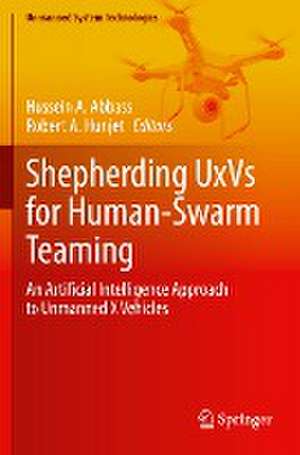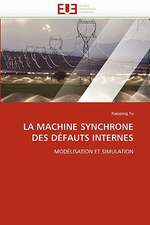Shepherding UxVs for Human-Swarm Teaming: An Artificial Intelligence Approach to Unmanned X Vehicles: Unmanned System Technologies
Editat de Hussein A. Abbass, Robert A. Hunjeten Limba Engleză Paperback – 20 mar 2022
- Presents a comprehensive look at human-swarm teaming;
- Tackles artificial intelligence techniques for swarm guidance;
- Provides artificial intelligence techniques for real-time human performance analysis.
| Toate formatele și edițiile | Preț | Express |
|---|---|---|
| Paperback (1) | 1219.46 lei 6-8 săpt. | |
| Springer International Publishing – 20 mar 2022 | 1219.46 lei 6-8 săpt. | |
| Hardback (1) | 1225.48 lei 6-8 săpt. | |
| Springer International Publishing – 20 mar 2021 | 1225.48 lei 6-8 săpt. |
Preț: 1219.46 lei
Preț vechi: 1487.15 lei
-18% Nou
Puncte Express: 1829
Preț estimativ în valută:
233.37€ • 241.09$ • 194.23£
233.37€ • 241.09$ • 194.23£
Carte tipărită la comandă
Livrare economică 26 martie-09 aprilie
Preluare comenzi: 021 569.72.76
Specificații
ISBN-13: 9783030609009
ISBN-10: 3030609006
Ilustrații: XX, 330 p. 88 illus., 44 illus. in color.
Dimensiuni: 155 x 235 mm
Greutate: 0.49 kg
Ediția:1st ed. 2021
Editura: Springer International Publishing
Colecția Springer
Seria Unmanned System Technologies
Locul publicării:Cham, Switzerland
ISBN-10: 3030609006
Ilustrații: XX, 330 p. 88 illus., 44 illus. in color.
Dimensiuni: 155 x 235 mm
Greutate: 0.49 kg
Ediția:1st ed. 2021
Editura: Springer International Publishing
Colecția Springer
Seria Unmanned System Technologies
Locul publicării:Cham, Switzerland
Cuprins
Introduction.- Introduction to Shepherding.- Introduction to Human-Swarm Teaming.- Swarm Shepherding on Ground.- Swarm Shepherding in Air.- Swarm Shepherding in Air Traffic Control.- Swarm Shepherding in Sea.- Genetic Algorithms for Optimizing Swarm Shepherding.- Reinforcement Learning for Swarm Shepherding.- Learning Classifier Systems for Swarm Shepherding.- Transparent Learning for Swarm Shepherding.- Ontology-guided Learning for Swarm Shepherding.- Mission Planning for Swarm Shepherding.- Real-Time Human Performance Analysis for Human-Swarm Teaming.- Trust for Human-Swarm Teaming.- Machine Education of Smart Shepherds.- The effect of communication range limits on shepherding performance.- Controlling the controllers: the multi shepherd swarm control problem.- Conclusion.
Notă biografică
Hussein A. Abbass is a Professor of information technology, University of New South Wales, Canberra, Australia. He is the Founding Editor-in-Chief of the IEEE Transactions on Artificial Intelligence. He is a fellow of the IEEE, the Australian Computer Society, the Operational Research Society, and the Australian Institute of Managers and Leaders. His main research interest is in artificial intelligence, brain computer interfaces, and human-swarm teaming. His research aims at designing next generation-trusted artificial intelligence systems that seamlessly integrate humans and Artificial Intelligence systems. He was been the Vice President for Technical Activities for the IEEE Computational Intelligence Society from 2016 to 2019, and the National President for the Australian Society of Operations Research from 2016-2019. He has been an Associate Editor of the IEEE Transactions on Neural Networks and Learning Systems, IEEE Transactions on Evolutionary Computation, IEEE Transactions on Cybernetics, IEEE TRANSACTIONS on Cognitive and Developmental Systems, and four other journals.
Robert A. Hunjet leads the Australian Defence Science and Technology (DST) Group’s Advanced Vehicle Systems science and technology capability. He holds an adjunct Associate Professorship with the School of Engineering and Information Technology, University of New South Wales, Canberra, Australia. His research interests are in the fields of autonomy of multi agent systems, swarming, mobile ad-hoc networking and distributed control. He serves on the TPC of the International Telecommunications Networking and Applications Conference, the governance panel of DST’s Trusted Autonomous Systems Strategic Research Initiative, and is co-lead of the Land Domain theme within Australia’s Defence Cooperative Research Centre for Trusted Autonomous Systems.
Robert A. Hunjet leads the Australian Defence Science and Technology (DST) Group’s Advanced Vehicle Systems science and technology capability. He holds an adjunct Associate Professorship with the School of Engineering and Information Technology, University of New South Wales, Canberra, Australia. His research interests are in the fields of autonomy of multi agent systems, swarming, mobile ad-hoc networking and distributed control. He serves on the TPC of the International Telecommunications Networking and Applications Conference, the governance panel of DST’s Trusted Autonomous Systems Strategic Research Initiative, and is co-lead of the Land Domain theme within Australia’s Defence Cooperative Research Centre for Trusted Autonomous Systems.
Textul de pe ultima copertă
This book draws inspiration from natural shepherding, whereby a farmer utilizes sheepdogs to herd sheep, to inspire a scalable and inherently human friendly approach to swarm control. The book discusses advanced artificial intelligence (AI) approaches needed to design smart robotic shepherding agents capable of controlling biological swarms or robotic swarms of unmanned vehicles. These smart shepherding agents are described with the techniques applicable to the control of Unmanned X Vehicles (UxVs) including air (unmanned aerial vehicles or UAVs), ground (unmanned ground vehicles or UGVs), underwater (unmanned underwater vehicles or UUVs), and on the surface of water (unmanned surface vehicles or USVs). This book proposes how smart ‘shepherds’ could be designed and used to guide a swarm of UxVs to achieve a goal while ameliorating typical communication bandwidth issues that arise in the control of multi agent systems. The book covers a wide range of topics ranging from the design ofdeep reinforcement learning models for shepherding a swarm, transparency in swarm guidance, and ontology-guided learning, to the design of smart swarm guidance methods for shepherding with UGVs and UAVs. The book extends the discussion to human-swarm teaming by looking into the real-time analysis of human data during human-swarm interaction, the concept of trust for human-swarm teaming, and the design of activity recognition systems for shepherding.
- Presents a comprehensive look at human-swarm teaming;
- Tackles artificial intelligence techniques for swarm guidance;
- Provides artificial intelligence techniques for real-time human performance analysis.
Caracteristici
Presents a comprehensive look at human-swarm teaming Tackles artificial intelligence techniques for swarm guidance Provides artificial intelligence techniques for real-time human performance analysis





































